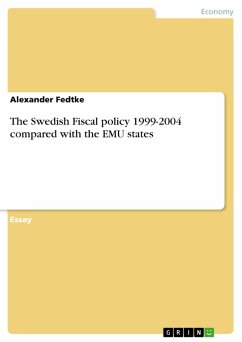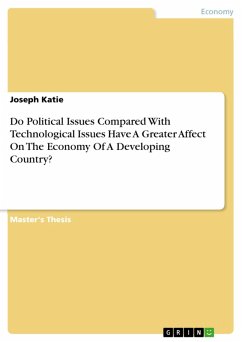Essay from the year 2006 in the subject Business economics - Economic Policy, grade: 1,5, Växjö University, course: Independent Project, language: English, abstract: I choose the topic "The Swedish Fiscal policy 1999-2004 compared with the EMU states." Because I want to find out whether the Swedish fiscal policy was counter-cycle compared to the EMU states1 or not. The EMU states have the Stability and Growth Pact (SGP) which set rules for their fiscal policies the pact was introduced in 1999 with the start of the EURO in 1999 began a change and the last actual data I found was 2004 that's why I choose this period. Among other things I want to figure out if the SGP has a negative effect on the fiscal policy in a recession. I start the paper with presenting the so called "Swedish Model" and the changes and development of the 1990s. Then I will present the Institutional framework in Sweden and the Budget process. After this I will present a definition of fiscal policy and start with the examination of the Swedish fiscal policy 1999-2004 present the methods I use and analysis the period. Then I compare the Swedish development with the EMU states and try to find out if the SGP has a pro-cyclical effect on the fiscal policy this would mean for example in a recession that the downtown takes longer and the economic fluctuation is stronger than without the SGP. In the end I present my conclusion and have a brief discussion. In this paper I will not cover aspects of tax development, labour market and monetary policies because of the lack of space.
Dieser Download kann aus rechtlichen Gründen nur mit Rechnungsadresse in A, B, BG, CY, CZ, D, DK, EW, E, FIN, F, GR, HR, H, IRL, I, LT, L, LR, M, NL, PL, P, R, S, SLO, SK ausgeliefert werden.









